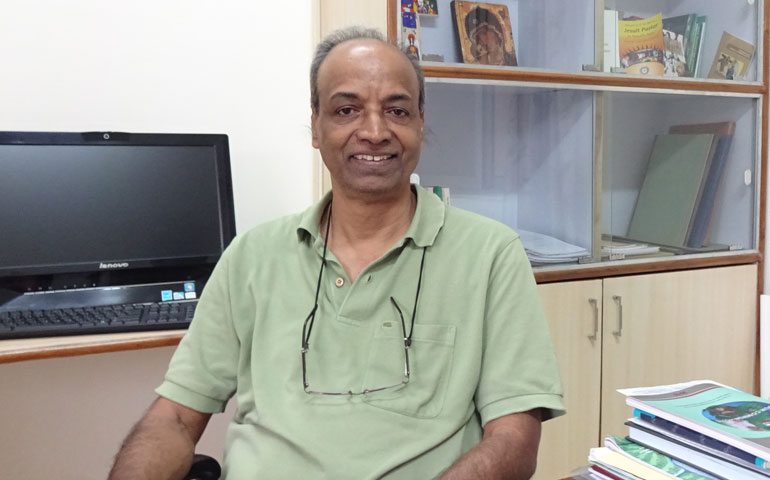
Jesuit Fr. George Pattery (Jose Kavi)
As the Society of Jesus gets ready to elect a new superior general, South Asia -- its largest unit -- looks forward to a leader who can help them respond to the challenges that Pope Francis has thrown at Catholic religious.
"The pope has been living his Jesuit vocation without proclaiming it. That has challenged the Society [of Jesus] to reflect deeper," said Fr. Varkey Perekkatt, the Jesuits' Delhi provincial.
The 76-year-old priest is among 46 people who will represent 4,030 Jesuits of South Asia at the 36th General Congregation, the top legislative body of the Society of Jesus. The congregation, which begins Oct. 2 in Rome, will elect a successor to the current superior general, Fr. Adolfo Nicholás, who is stepping down after almost nine years in office.
According to Perekkatt, introspection would bring about personal and structural changes among the Jesuits.
 "Whether we like it or not, most of our institutions are middle-class and above middle-class," Perekkatt told NCR. He said internal changes of each Jesuit will lead to collective transformation of the congregation as well as society. Such changes are required for the society to get back to its charism of caring for the poor, he said.
"Whether we like it or not, most of our institutions are middle-class and above middle-class," Perekkatt told NCR. He said internal changes of each Jesuit will lead to collective transformation of the congregation as well as society. Such changes are required for the society to get back to its charism of caring for the poor, he said.
Perekkatt said he regrets that the Jesuits' social action has become increasingly institutionalized and their preferential option for the poor has been watered down. This pro-poor option was the challenge the Jesuits' 32nd General Congregation in 1974 put forward to the church.
The Jesuits then insisted serving the faith through the promotion of justice and formed numerous grassroots movements that worked for the poor and downtrodden. In the 1970s and 1980s, "we were in villages," Perekkatt recalled.
However, many institutions emerged over the years as social action became structured.
"Gradually, we became project managers and moved into many institutions," said the priest, who is the former head of the Jesuits of South Asia and attended the 34th General Congregation in 1995.
Social scientist Fr. Ambrose Pinto, who has headed Jesuit social institutes in New Delhi and Bangalore, southern India, said Francis has taken over from the Jesuits the "prophetic role" of challenging unjust structures and calling for a new world that has a preferential option for the poor.
"What at one juncture was considered the mission of the Society [of Jesus] of faith and justice has become the mission of the entire church," said Pinto, who is now in Bangalore.
The pope, Pinto told NCR, has "radicalized the church" in such a way the Jesuits' General Congregation "may have to fall back on many things the Holy Father has said to reinvent its mission for today."
Fr. Joseph Thadavanal, who works in Bihar, eastern India, also finds Francis challenging all religious, not just Jesuits, to listen to the poor. Francis has become an "inspiring and empowering figure" and "a strong moral voice" in a disintegrating world situation, he said.
Hence, the pope's personal example will greatly impact the Jesuit meeting, which will "grapple with the pressures of a fast-changing world," he told NCR in an email interview.
The pope's initiative to reform the church and society has given the Jesuits new enthusiasm, said Fr. George Pattery, who now heads the South Asian Jesuits. The 65-year-old Indian Jesuit leader welcomes the pope's leadership and applauds his initiative to implement the church reforms the Second Vatican Council envisioned.
Pattery is happy that the Jesuits have a good rapport with Francis. Earlier, the society, the largest Catholic religious order for men, had faced problems, due to the Vatican's difficulty in understanding the Jesuit interpretation of justice and faith, Pattery said.
"We now have a good moment, as the highest authority in the church is leading a mission that we had been shouldering all alone," he added.
Fr. George Mutholil, Jesuit provincial of Kerala and a delegate to the General Congregation, said Francis has helped the society to become more popular. "In some places, vocations are more. Whether these will lead to lasting impact needs to be seen," he said in an email interview.
What do South Asians expect from the meeting?
Jesuits NCR interviewed dodged the question whether one of them would become the next superior general.
"We elect the best man possible. In that choice, we do not look at the nationality," Pattery asserted. He pointed out that the Jesuits have never had a superior general from North America, even though that region had the largest number of Jesuits for many years. "We look for a capable leader who is exposed to various missions of the society," he added.
Pinto opposes comparing Jesuits. Such exercises would undermine the "collective wisdom" of the order, he asserted. The delegates will discern and elect someone capable of leading the Jesuits, he said.
Thadavanal wants the 36th General Congregation to elect someone who can lead the order in "these critical times." More than producing new documents, he wants the delegates to focus on mission and life and devise "a new governance structure for the emerging Society."
Perekkatt expects the meeting to redefine "our old mission of service of faith and promotion of justice" and integrate dialogue, inculturation and concern for environment the later congregations had stressed.
"We will address all these problems and seek how we can contribute in solving them," he added.
Fr. William Abranches, secretary to the provincial of South Asia, said South Asia's urgent issues will take priority in the thinking of Jesuits worldwide. These are: interfaith harmony and sectarian violence, climate change, and social justice arising from poverty and displacement of peoples.
Abranches, a former Jesuit provincial of Gujarat, noted that Jesuits in South Asia have laid down their lives for the poor. Jesuit Fr. Tom Gaffney, an American, was found with his throat slit in Kathmandu, Nepal, in December 1997. He founded the St. Xavier Social Service Centre in 1970, a home to orphaned, abandoned, homeless and destitute children from 75 districts of Nepal.
A couple of months before Gaffney's death, Jesuit Fr. Anchanikal Thomas was killed in Jharkhand, eastern India. He worked among poor tribal people who were caught between insurgents and landowners.
In 2014, Jesuit Fr. Alexis Prem Kumar, who worked with Jesuit Refugee Service in Afghanistan, was kidnapped by the Taliban. He was later released unharmed, Abranches wrote in a piece for Matters India.
Pinto said the Jesuits are at the crossroads now, as some among them think their order has lost its vigor and vitality because of institutionalization.
"While the mission of the Society [of Jesus] is to work for a world of equality, fraternity and justice, there is a perception that the society has been used as an instrument by corporations and international business to suit their needs," Pinto explained.
Jesuits have failed to denounce neoliberalism and have opened more institutions to teach business and commerce. "With stress on counseling, psychology and spirituality, more and more Jesuits have become individualistic, unable to respond to the harsh realities of the world around," Pinto said.
The social scientist wants the General Congregation to direct the Jesuits to shutter institutions that do not serve the mission of the society and to provide an impetus for involvement in grassroots movements.
According to Pinto, Jesuits can make "a difference to the world in struggle" only if they can produce leaders for social movements to inspire commitment, mobilize resources, create and recognize opportunities, devise strategies, frame demands, and influence outcomes.
Pinto expressed his concern over recent trends to turn the order monastic. "The Society of Jesus was never meant to be monastic," he asserted. He said his congregation has lost its freshness in mission.
"What really happens to an order that was expected to look at the world as Jesus looked at it and instead looks inward? We become closed and miss our vision and mission," Pinto warned. He pleaded that the coming meeting define community "as a tool for mission instead of mission itself."
Pinto also wants the Jesuits to give top priority to the "intellectual dimensions of the mission."
However, he said the Society of Jesus is as relevant today as it was when it was founded. A religious order cannot become irrelevant as long as it can raise new questions and new issues, and reflect creatively and critically on current issues.
"The strength of the Society of Jesus, wherever its location, has been in its constant search for questions to respond to emerging concerns and realities. That freshness is what makes the society relevant," he claimed.
"My expectation from the [General] Congregation is therefore a radical document that highlights the concerns of the Holy Father and the universal church and election of a prophetic general who would lead the society by helping the society to discern the signs of the times."
[Jose Kavi is the editor-in-chief of Matters India, a news portal focusing on religious and social issues in India.]


